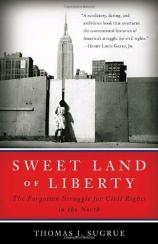Sweet Land of Liberty: The Forgotten Struggle for Civil Rights in the North
Review
Sweet Land of Liberty: The Forgotten Struggle for Civil Rights in the North
Slavery was a Southern phenomenon, and the civil rights
movement, in its most public aspect, focused on the South, a myopic
viewpoint that ignored the very real battles that were being fought
in the North. There is also a common myth that civil rights as a
whole ceased to be a movement of any consequence after the 1960s.
SWEET LAND OF LIBERTY addresses both misconceptions.
The author of this extensively researched history is Thomas J.
Sugrue, whose first book, THE ORIGINS OF THE URBAN CRISIS, won the
prestigious Bancroft Prize in History, the President's Book Award
of the Social Science History Association, the Philip Taft Prize in
Labor History, the Urban History Association Prize for Best Book in
North American Labor History, and was selected as a Choice
Outstanding Book. In 2005, Princeton University Press selected THE
ORIGINS OF THE URBAN CRISIS as one of its 100 most influential
books of the preceding century. Sugrue's academic career has been
punctuated with activism, the combination making him well qualified
to deal even-handedly with this subject matter. What he has written
here is a history of political reality.
It is true that organization and activism came earlier to the
North, where during the Great Depression and on through the
aftermath of World War II, "devout churchwomen, lawyers, laborers,
Democrats, Republicans, Socialists and Communists marched together
on picket lines, lobbied public officials and joined in lawsuits
against segregated housing and schools." The toil of Northern
change agents fostered and informed the tactics used in the South,
and the Southern initiatives and successes enheartened Northern
activists. In the North, people of color were more likely to be
able to attend public events and shop in the same stores with
whites, but infamous unwritten "Jim Crow laws" prevented all blacks
in the U.S. from, for example, being able to stay overnight while
traveling in any but a few locations known through the elaborate
cultural grapevine. Among these venues were the YMCAs in Northern
cities where Christian principle had won out over racial bias,
though not without the push of concerned citizens, including many
strong, dedicated churchwomen of both races. These small victories
were an inspiration to Southern blacks who either migrated North
hoping for a brighter future or joined the battle at home in the
1960s.
But the right to watch a movie was hardly a satisfaction to
masses of people living in poverty and losing out on the great
dream of all Americans --- the right to an equal and excellent
education. That right, it seemed, could not be made a reality
despite all the legislation designed to guarantee it. The key to
securing equality in public education lay in securing equality in
housing. This was a drama that is still being played out in
America. Gerrymandering had its nefarious role in underpinning de
facto school segregation. Black neighborhoods could be written off
the map, a racist tactic practiced on both sides of the Mason-Dixon
line. School busing was one of many strategies to circumvent the
phenomena of gerrymandering, ghetto-ization and "white flight," all
of which left African American families in the dust and their
children in schools as inferior as those of the years of legal
segregation.
The book sings the unsung, people like Roxanne Jones, a southern
migrant to Philadelphia, who, abandoned by her alcoholic husband,
was challenged by the issues facing African American women in the
projects. "Public housing never lived up to its promise. Cheap
construction caused all sorts of problems…the corridors were
dimly lit and dangerous. The lawns surrounding the towers were
muddy and trash strewn." Unmarried mothers were under constant
surveillance by welfare workers and increasingly marginalized by
lack of employment, unfair credit practices and lack of
representation within the systems that regulated their economic
existence. Jones organized others and spearheaded initiatives to
raise welfare rates (in the early 1970s, "a family of four barely
survived on the average annual payment of $3,600). As Sugrue puts
it, "Jones did not see litigation and community organizing as
antithetical" and had no hesitation to lead protests, once getting
arrested for throwing a shoe through a window of the Pennsylvania
state capitol.
As Sugrue is careful to point out, whites in general have had
more resources of social capital to bring to bear than their black
fellow citizens. Withdrawal from mixed or marginal neighborhoods,
or gentrification of historic areas forcing poor inhabitants out,
has become new factors affecting the quality of schools and the
livability of cities and towns. True integration in America is
still a rarity.
SWEET LAND OF LIBERTY comes to us at a telling time in our
nation's history when many of the struggles highlighted in its
pages are still being fought in subtle ways as we face the hopeful
future. It will be read by thoughtful students of our racial
history. Perhaps by remembering the past, we will not be condemned
to repeat it.
Reviewed by Barbara Bamberger Scott on June 2, 2011
Sweet Land of Liberty: The Forgotten Struggle for Civil Rights in the North
- Publication Date: October 13, 2009
- Genres: History, Nonfiction
- Paperback: 736 pages
- Publisher: Random House Trade Paperbacks
- ISBN-10: 0812970381
- ISBN-13: 9780812970388




